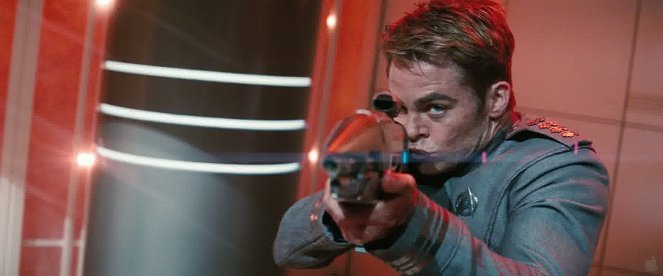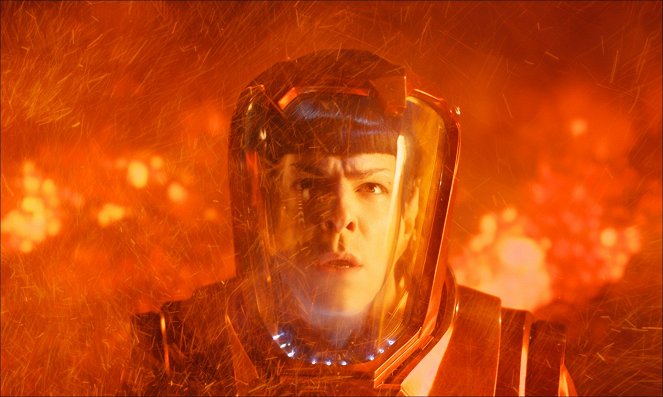Directed by:
J.J. AbramsCinematography:
Dan MindelComposer:
Michael GiacchinoCast:
Chris Pine, Zachary Quinto, Zoe Saldana, Karl Urban, Simon Pegg, John Cho, Benedict Cumberbatch, Anton Yelchin, Bruce Greenwood, Peter Weller, Alice Eve (more)VOD (2)
Plots(1)
When the crew of the Enterprise is called back home, they find an unstoppable force of terror from within their own organization has detonated the fleet and everything it stands for, leaving our world in a state of crisis. With a personal score to settle, Captain Kirk leads a manhunt to a war-zone world to capture a one man weapon of mass destruction. As our heroes are propelled into an epic chess game of life and death, love will be challenged, friendships will be torn apart, and sacrifices must be made for the only family Kirk has left: his crew. (official distributor synopsis)
(more)Videos (36)
Reviews (14)
Star Trek for the whole family. Whereas the first modern Star Trek movie established bonds (not only between the characters, but between the characters and viewers unfamiliar with Star Trek), the sequel’s plot is built on the danger of those bonds being broken. Several of the alternative family models find themselves in peril. Kirk and Spock are driven by a thirst for revenge after their surrogate father is killed before their eyes. Carol is seeking a new, more trustworthy family onboard the Enterprise and Harrison’s crew has become his family as well. Thanks to the strong family subtext, Into Darkness is emotionally rich, but it doesn’t manage to directly face up to its melodramatic leanings (glycerine tears, Spock bellowing the villain’s name) and relativises them in every possible way through childish joking and placing them in a context that prevents the expression of emotion (Spock’s reaction, for example, is primarily a quote). The attempt at a constantly brisk narrative pace hinders the logical consistency of the story. The characters break or disregard regulations as it suits the screenwriter, some motivations are unclear and a lot of decisions are dubious. On the other hand, Abrams makes excellent use of every piece of the provided information, whether in the dialogue or action scenes (with shots that say more in one go than is common in today’s action movies). He continuously raises the stakes in the build-up of the action sequences: higher probability of error/greater loss, if errors occur/multiplication of objectives to be achieved through action. The final battle is an excellent example of how to overwhelm viewers with spectacle and, at the same time, make them think about the possible impacts of the actions that they have watched. Though it happens on the basis of an unconvincing chain of events, the scene itself is gripping. The dubious significance of similarly self-indulgent episodes in the narrative as a whole repeatedly points out to us that the film follows the narrative logic of television series (or video games). Many events have no consequences and stick out like a sore thumb, though they will thrill the mind of any nerd (a key scene from The Wrath of Khan turned upside down, Alice Eve in her underwear). It is not clear from the presented facts why some things happen in an exceedingly complicated way, or rather why some useless information is being provided to us (the circumstances leading to the explosion in the Archive). Other, more valuable information was left out for the sake of convenience (the improbably quick “modification” of 72 torpedoes before Harrison appropriates them, the premature cut-off of the rescue scene using a human chain, which doesn’t look solid at all). The new Star Trek would need to fill a lot of holes, but even with those holes, it is a top-rate summer blockbuster with a thrilling pace, a humanly monstrous bad guy and tremendous value added for everyone who has spent a fair amount of time in Gene Rodenberry’s world. 85%
()
(less)
(more)
If you really wanted to, you could say that Abrams created a multi-layered, sophisticated revival of Star Trek, in which he strengthened and updated all aspects of the classic series, not only its idealism and ethos, but also its campiness. However, it is rather more appropriate to admit that the second new Star Trek has some fundamental problems that make its unintentionally ridiculous elements stand out, with the terrifying replay of all of the main participants at the fore. The script is the film’s Achilles heel, as it is built around a single major twist connected with the revelation of the main antagonist’s name and the resulting variations on the iconic moments of the classic Star Trek films. Other than those elements, however, the film offers nothing else that would attract the viewer’s attention and thus strengthen the effectiveness of those moments. If with the new Star Wars Abrams sponsored the creation of great fan fiction, which inventively varied, overturned, updated and enriched the canon, Star Trek Into Darkness is a prime example of sloppy fanfiction that merely varies its template in a non-conceptual way, but does not bring anything new or independently functional into it. We could theoretically be thankful that Star Trek has thus paradoxically become a frightening example from which the folks at Disney learned and therefore entrusted only the first of the new sequels to Abrams. The second Star Trek showed that Abrams is great at creating new and clever variations of old worlds, but he unfortunately does not know what to do with them the second time around.
()
I can hardly abstract from the emotional factor because, as in the previous episode, I felt at home swallowing Abrams' upgraded poetics of the rigid Federation and the less-clamped crew of the Enterprise to the fullest. In some ways, the flight into darkness is a little less consummate than its predecessor - it was actually atypically brisk, functional, dynamically connected and clever for a prologue. He built the foundations of a new mythology, paid homage to the old, and economically sketched the new chemistry of the characters. The sequel toils more with the explanation of some motivations and events, the last instance being deus ex machina, or a reference outside the world of film (to The Wrath of Khan, to the series episode "Space Seed", to the first Abrams ST, to the accompanying comics, etc.). As a result, Into Darkness may seem like a nerd encyclopedia with poor logic. To some extent, I agree. Anyway, if we abstract from the occasional naivety, unsuccessfully pointed dialogue, and a certain sparsity (or rather evasion) of the script, the film simply works. The film elegantly uses the established motifs, cleverly re-interprets familiar events with a raster of "changed reality", all while not forgetting to work with a key element of the new ST: the relationship between Kirk and Spock. In many ways, it surprisingly brings them together (fatherly motif, anger) while not only acting as a derivative of the original film duo. Cumberbatch in the role of Khan is probably the most successful transcript - he was able to combine a certain human fragility with the theatricality of Ricardo Montalbán, and he also acts as a catalyst: in some ways he is similar to Spock (superior physical and mental abilities), and in some ways to Kirk (obvious interest in improvisation and problems with self-control and order). In any case, he puts them both in a situation where they have to reconsider their basic attitudes and views on their service. Fortunately, he does not resemble in any way the "destructive fateful" villains that Christopher Nolan so masterfully constructed, but he is actually old-fashioned at his core (good old fashioned revenge). The new ST is primarily an attraction. At times, it seems that the obsessive fondness for thinking and rendering that the Star Trek series is famous for was set aside and was replaced by pure dynamics. Nevertheless, observing the ingenuity and dynamism of often parallel and precisely constructed actions brings almost infantile pleasure. So does experiencing bursts of nostalgia from familiar scenes that shine again and, despite a certain rational calculation, still work and enrich the new story. A film where everything is in place for me. Sometimes it's a bit mysterious how it got there, but ST simply offers enough for a viewer raised on Rodenberry's world to come to terms with it.
()
The story of the most genuine and strongest male friendship – and breathtaking action/adventure into places where many would never dare set foot as a little bonus. Chris Pine proves that the moment he puts on the yellow-black suit, he absolutely nails everything; Karl Urban traditionally expresses the emotions involved, even if it's just raising an eyebrow; and this time around the tried-and-true creative team is playing it safe Although in a few places they unnecessarily rely on the audience's knowledge of Star Trek II: The Wrath of Khan, Abrams and the screenwriters didn't miss this opportunity. Almost every bit of dialogue leads to explosive consequences, and in the face of an unpredictable character that Benedict Cumberbatch gives the power of a fallen angel, all criticisms must inevitably fade away. Not to mention that during the final half hour, it almost exclusively plays on the first emotional signal and rational considerations are definitively put aside. An astonished 90%, with a lingering slight trembling and eternal sadness that the creator of the best reboot in history has sailed off into a galaxy far, far away.
()
Star Trek shattered the traditional concept of space opera with all its naivety and old rituals and boldly stepped toward the younger generation and those who had remained outside the world created by Gene Roddenberry. It resulted in an entertaining blockbuster that is modern, dynamic, and full of action, battles, memorable lines, and tension - simply a likable popcorn movie for mass audiences. The sequel follows a similar spirit, although it reduced the number of memorable lines and humor, replacing them with pathos and, in some cases, pure sentiment (yes, brave space heroes are not ashamed of shedding tears), and overall the film slightly lost the lightness of its predecessor. On the other hand, it is by no means a failure; many sequels struggle to even come close to the original film's quality (Guy Ritchie could tell you all about that). The film's generous production, breathtaking special effects scenes, the action following one after another, and the fast pace prevent viewers from noticing the gaps in logic and the simplicity of the story. This type of blockbuster is not meant for contemplation or reflection, but for quick consumption, and it fulfills this role more than adequately. Overall impression: 80%.
()


